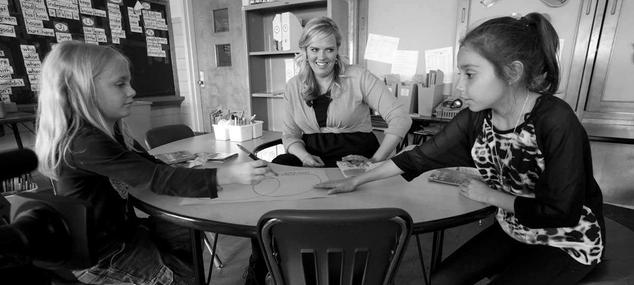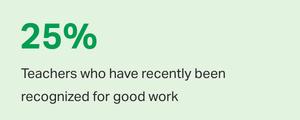As millions of students and educators count down the days until summer, they often take time to reflect on the past school year and celebrate accomplishments. Taking time to acknowledge big achievements is important, but recognition shouldn't just be part of a routine sendoff at the end of a successful school year -- it should be a way of everyday life.
Unfortunately, most schools and workplaces struggle to deliver adequate recognition. Gallup has asked more than 25 million employees around the world -- including more than 100,000 educators -- about what makes them engaged at work. K-12 teachers rate one item lower than any other on the survey: "In the last seven days, I have received recognition or praise for doing good work." Just 29% of teachers in Gallup's employee engagement database say they "strongly agree" with this statement.
This low percentage is alarming because beliefs and actions related to recognition are key drivers of what makes some principals more successful than others in the eyes of teachers. In a recent study of principals, Gallup asked teachers to rate their principal on a wide range of measures including management style, philosophy and school climate. Principals with the highest level of talent elicited a very different set of responses from their teachers. These great principals:
- value recognition as a frequent and ongoing activity that builds a strong, positive school culture
- see recognition as a necessary ingredient and key driver of school success, rather than just another event on their calendar
- take the lead and get personally involved by playing an active role in the recognition process
- are not content with being the sole source of recognition, and build an environment in which recognition is contagious and everyone plays an important role
Some principals stand out for their effectiveness in building a culture of recognition -- but what about the rest? How can everyone else better meet this important standard for a successful workplace? The answer is embedded within this statement: "In the last seven days, I have received recognition or praise for doing good work."
- "In the last seven days …": Some people think that the "seven days" reference means they should interpret the item literally, with a specific time frame attached. However, when looking at the distribution of responses across the 1-to-5 scale, recognition tends to be more evenly distributed than most other items. It is not a yes-or-no toggle switch; it's a 1-to-5 dimmer switch. Is it literally seven days? For most people, probably not. But it needs to be recent enough to remain top of mind. If you have to stop and think about when the recognition took place, it was probably not recent enough.
- "… I have received recognition or praise …": What counts as recognition for each individual? You won't know until you ask. Great principals ask their staff about the best recognition they've ever received, and are amazed by the range of answers they get. For some, seeing a peer receive recognition counts for them too, because they know they contributed to the successful partnership. While mementos aren't necessarily a bad thing, they often end up as clutter on desks or are tucked away in boxes, never to be seen again. For many, meaningful recognition is not about what they are given, but how it makes them feel. Moments of meaningful recognition and praise create vivid memories that last well into the future.
- "… for doing good work.": Meaningful recognition is earned, and is often associated with the contribution one makes to the larger goal at work. Organizational psychology teaches us that praise for a character trait such as intelligence may feel nice in the moment, but may not transfer to other situations. Praise for effort both feels good and can spur individuals to achieve in related situations again in the future.
Giving recognition does not come naturally to everyone. Some of us need more tools, resources and partnerships to ensure that it is done well. Research shows that great principals create great workplaces for their teams and that recognition is a key driver of great workplaces. Further, teachers value principals who create a culture of recognition above almost any other issue.
As principals, teachers and students enjoy this season of celebrating the accomplishments of another school year, let's commit to finding more ways to build more recognition into our schools and workplaces.

